EWOFL's Legal and Ethical Obligations: A Child Labor Case Study
VerifiedAdded on 2023/06/13
|6
|1380
|139
Case Study
AI Summary
This case study examines the ethical and legal implications for EWOFL, a company dealing with a South American chocolate manufacturer, Guevara, allegedly employing child labor. It applies utilitarianism and relevant ILO and UNCRC conventions to assess the legality and ethicality of EWOFL's continued transactions with Guevara. The analysis considers factors such as the nature of the work, the children's ages, and potential impacts on their education and well-being. The study concludes that EWOFL's actions are not necessarily illegal or unethical without further evidence of exploitation, recommending continued transactions unless such proof emerges, to maximize utility for all stakeholders, including the families benefiting from the employment.
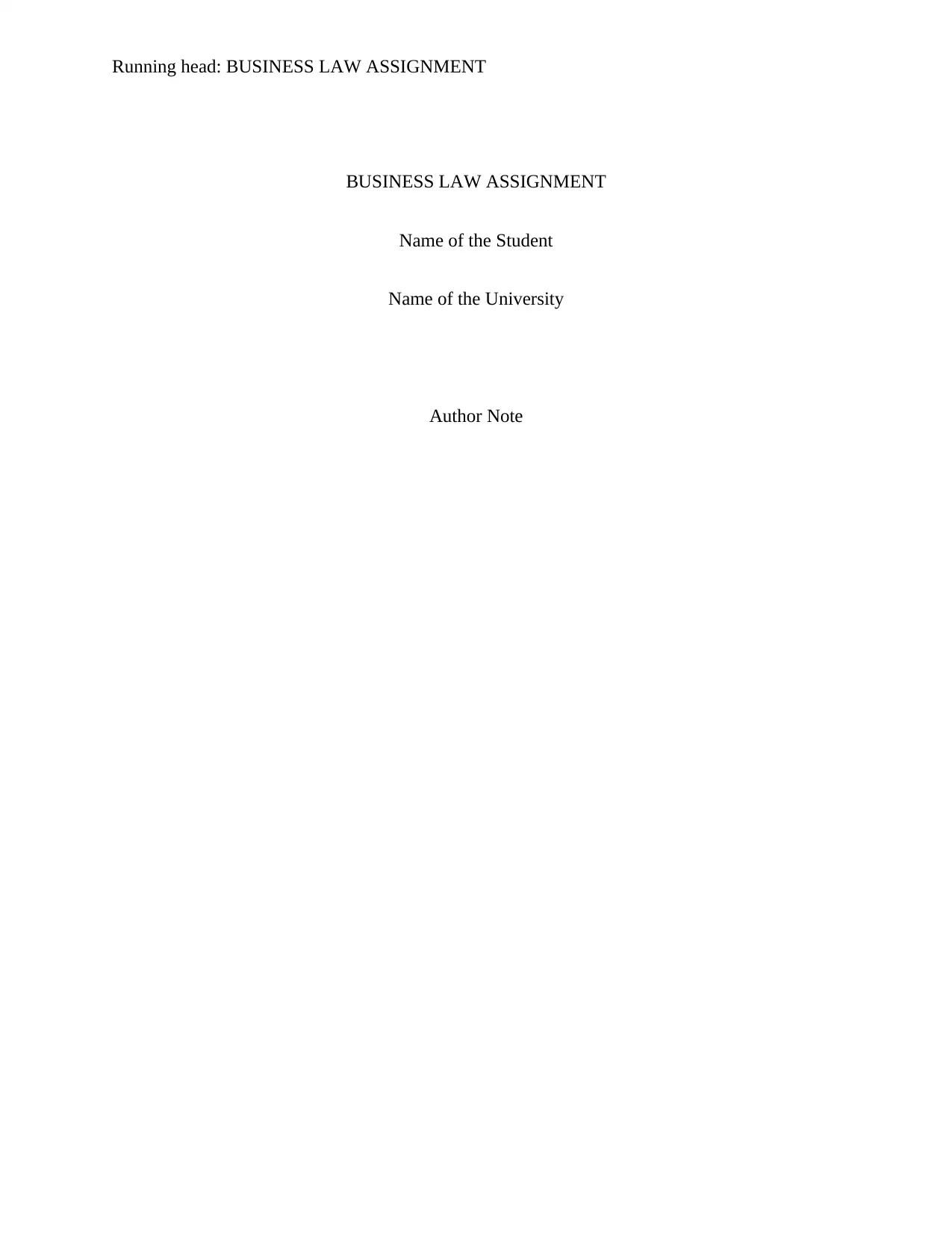
Running head: BUSINESS LAW ASSIGNMENT
BUSINESS LAW ASSIGNMENT
Name of the Student
Name of the University
Author Note
BUSINESS LAW ASSIGNMENT
Name of the Student
Name of the University
Author Note
Paraphrase This Document
Need a fresh take? Get an instant paraphrase of this document with our AI Paraphraser
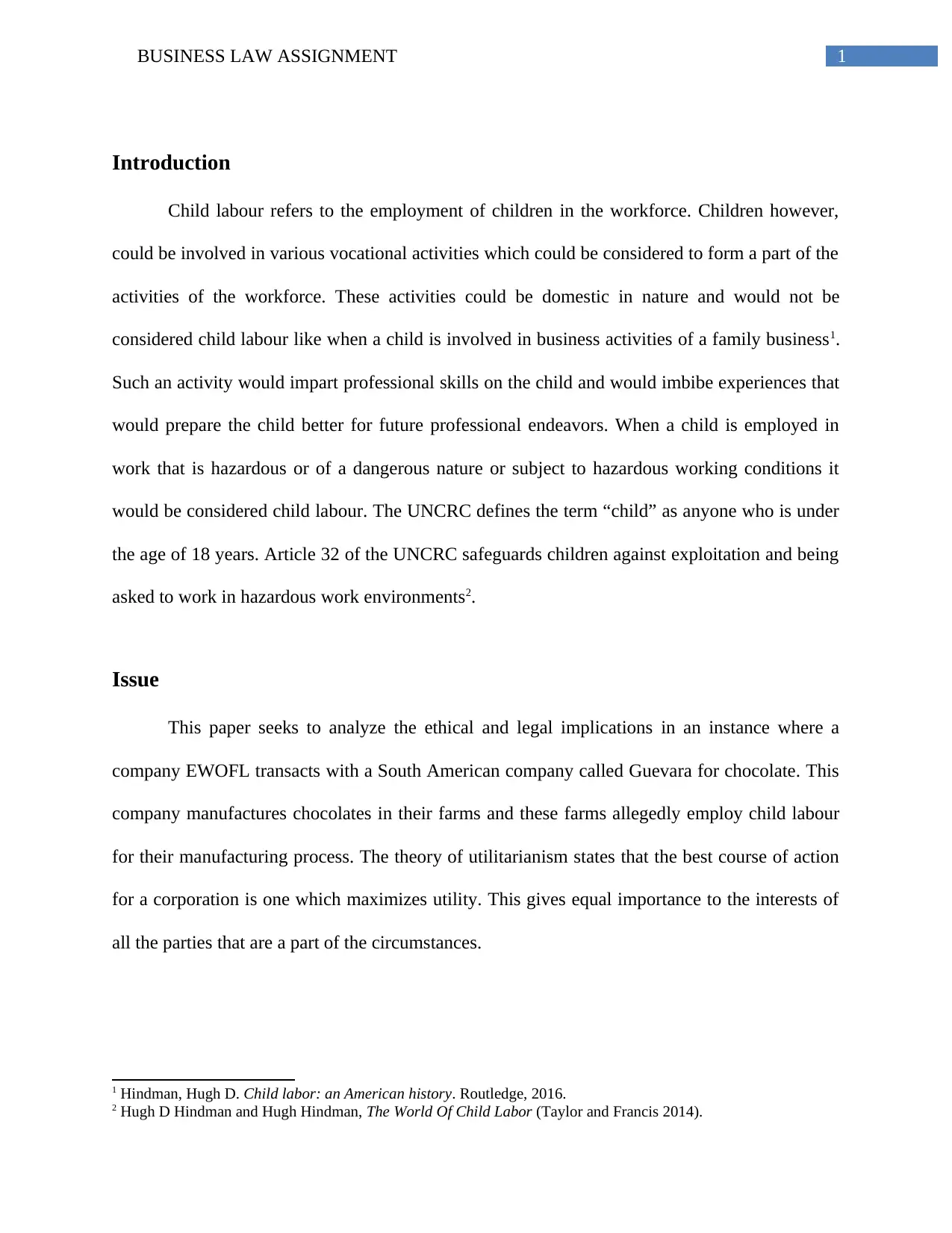
1BUSINESS LAW ASSIGNMENT
Introduction
Child labour refers to the employment of children in the workforce. Children however,
could be involved in various vocational activities which could be considered to form a part of the
activities of the workforce. These activities could be domestic in nature and would not be
considered child labour like when a child is involved in business activities of a family business1.
Such an activity would impart professional skills on the child and would imbibe experiences that
would prepare the child better for future professional endeavors. When a child is employed in
work that is hazardous or of a dangerous nature or subject to hazardous working conditions it
would be considered child labour. The UNCRC defines the term “child” as anyone who is under
the age of 18 years. Article 32 of the UNCRC safeguards children against exploitation and being
asked to work in hazardous work environments2.
Issue
This paper seeks to analyze the ethical and legal implications in an instance where a
company EWOFL transacts with a South American company called Guevara for chocolate. This
company manufactures chocolates in their farms and these farms allegedly employ child labour
for their manufacturing process. The theory of utilitarianism states that the best course of action
for a corporation is one which maximizes utility. This gives equal importance to the interests of
all the parties that are a part of the circumstances.
1 Hindman, Hugh D. Child labor: an American history. Routledge, 2016.
2 Hugh D Hindman and Hugh Hindman, The World Of Child Labor (Taylor and Francis 2014).
Introduction
Child labour refers to the employment of children in the workforce. Children however,
could be involved in various vocational activities which could be considered to form a part of the
activities of the workforce. These activities could be domestic in nature and would not be
considered child labour like when a child is involved in business activities of a family business1.
Such an activity would impart professional skills on the child and would imbibe experiences that
would prepare the child better for future professional endeavors. When a child is employed in
work that is hazardous or of a dangerous nature or subject to hazardous working conditions it
would be considered child labour. The UNCRC defines the term “child” as anyone who is under
the age of 18 years. Article 32 of the UNCRC safeguards children against exploitation and being
asked to work in hazardous work environments2.
Issue
This paper seeks to analyze the ethical and legal implications in an instance where a
company EWOFL transacts with a South American company called Guevara for chocolate. This
company manufactures chocolates in their farms and these farms allegedly employ child labour
for their manufacturing process. The theory of utilitarianism states that the best course of action
for a corporation is one which maximizes utility. This gives equal importance to the interests of
all the parties that are a part of the circumstances.
1 Hindman, Hugh D. Child labor: an American history. Routledge, 2016.
2 Hugh D Hindman and Hugh Hindman, The World Of Child Labor (Taylor and Francis 2014).
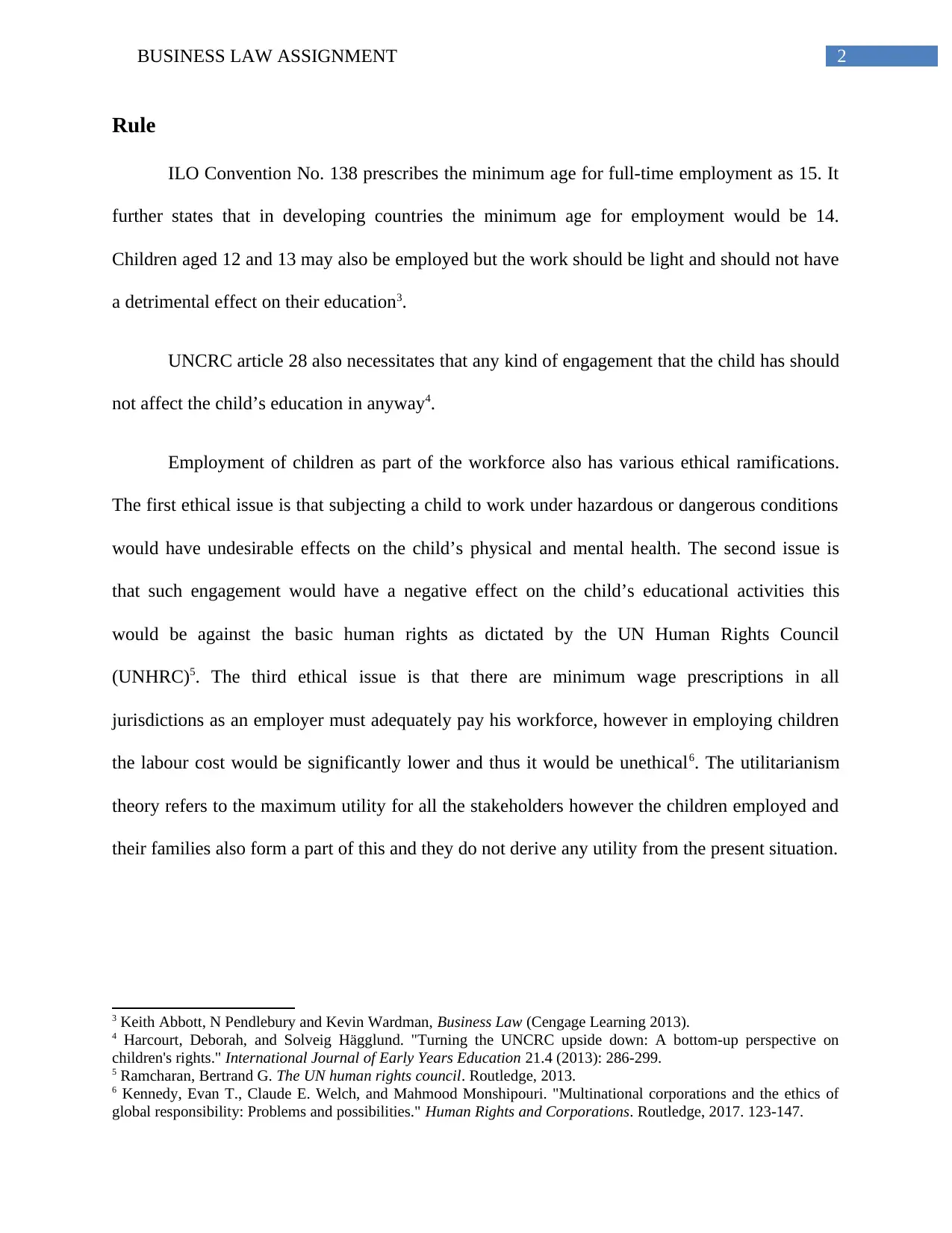
2BUSINESS LAW ASSIGNMENT
Rule
ILO Convention No. 138 prescribes the minimum age for full-time employment as 15. It
further states that in developing countries the minimum age for employment would be 14.
Children aged 12 and 13 may also be employed but the work should be light and should not have
a detrimental effect on their education3.
UNCRC article 28 also necessitates that any kind of engagement that the child has should
not affect the child’s education in anyway4.
Employment of children as part of the workforce also has various ethical ramifications.
The first ethical issue is that subjecting a child to work under hazardous or dangerous conditions
would have undesirable effects on the child’s physical and mental health. The second issue is
that such engagement would have a negative effect on the child’s educational activities this
would be against the basic human rights as dictated by the UN Human Rights Council
(UNHRC)5. The third ethical issue is that there are minimum wage prescriptions in all
jurisdictions as an employer must adequately pay his workforce, however in employing children
the labour cost would be significantly lower and thus it would be unethical6. The utilitarianism
theory refers to the maximum utility for all the stakeholders however the children employed and
their families also form a part of this and they do not derive any utility from the present situation.
3 Keith Abbott, N Pendlebury and Kevin Wardman, Business Law (Cengage Learning 2013).
4 Harcourt, Deborah, and Solveig Hägglund. "Turning the UNCRC upside down: A bottom-up perspective on
children's rights." International Journal of Early Years Education 21.4 (2013): 286-299.
5 Ramcharan, Bertrand G. The UN human rights council. Routledge, 2013.
6 Kennedy, Evan T., Claude E. Welch, and Mahmood Monshipouri. "Multinational corporations and the ethics of
global responsibility: Problems and possibilities." Human Rights and Corporations. Routledge, 2017. 123-147.
Rule
ILO Convention No. 138 prescribes the minimum age for full-time employment as 15. It
further states that in developing countries the minimum age for employment would be 14.
Children aged 12 and 13 may also be employed but the work should be light and should not have
a detrimental effect on their education3.
UNCRC article 28 also necessitates that any kind of engagement that the child has should
not affect the child’s education in anyway4.
Employment of children as part of the workforce also has various ethical ramifications.
The first ethical issue is that subjecting a child to work under hazardous or dangerous conditions
would have undesirable effects on the child’s physical and mental health. The second issue is
that such engagement would have a negative effect on the child’s educational activities this
would be against the basic human rights as dictated by the UN Human Rights Council
(UNHRC)5. The third ethical issue is that there are minimum wage prescriptions in all
jurisdictions as an employer must adequately pay his workforce, however in employing children
the labour cost would be significantly lower and thus it would be unethical6. The utilitarianism
theory refers to the maximum utility for all the stakeholders however the children employed and
their families also form a part of this and they do not derive any utility from the present situation.
3 Keith Abbott, N Pendlebury and Kevin Wardman, Business Law (Cengage Learning 2013).
4 Harcourt, Deborah, and Solveig Hägglund. "Turning the UNCRC upside down: A bottom-up perspective on
children's rights." International Journal of Early Years Education 21.4 (2013): 286-299.
5 Ramcharan, Bertrand G. The UN human rights council. Routledge, 2013.
6 Kennedy, Evan T., Claude E. Welch, and Mahmood Monshipouri. "Multinational corporations and the ethics of
global responsibility: Problems and possibilities." Human Rights and Corporations. Routledge, 2017. 123-147.
⊘ This is a preview!⊘
Do you want full access?
Subscribe today to unlock all pages.

Trusted by 1+ million students worldwide
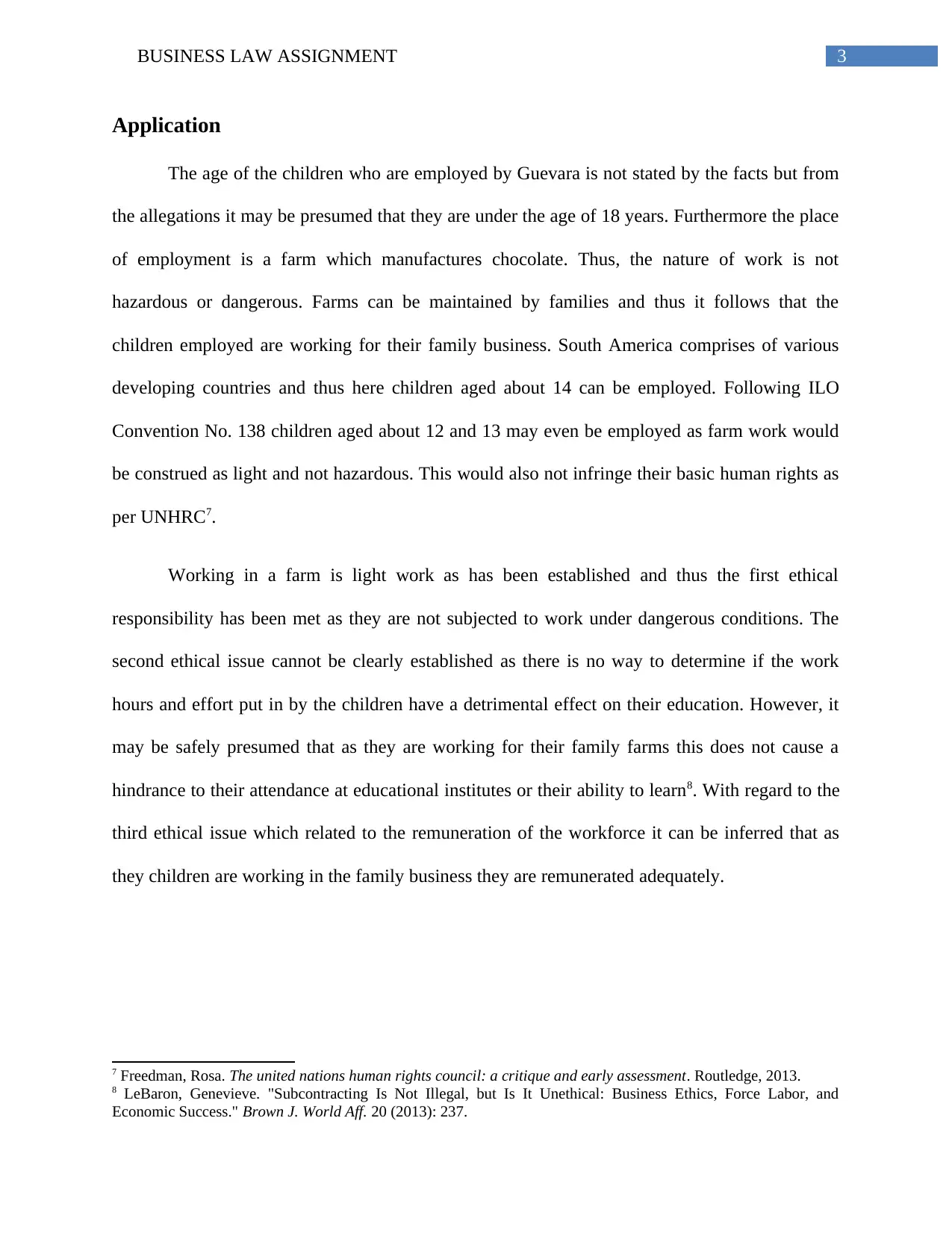
3BUSINESS LAW ASSIGNMENT
Application
The age of the children who are employed by Guevara is not stated by the facts but from
the allegations it may be presumed that they are under the age of 18 years. Furthermore the place
of employment is a farm which manufactures chocolate. Thus, the nature of work is not
hazardous or dangerous. Farms can be maintained by families and thus it follows that the
children employed are working for their family business. South America comprises of various
developing countries and thus here children aged about 14 can be employed. Following ILO
Convention No. 138 children aged about 12 and 13 may even be employed as farm work would
be construed as light and not hazardous. This would also not infringe their basic human rights as
per UNHRC7.
Working in a farm is light work as has been established and thus the first ethical
responsibility has been met as they are not subjected to work under dangerous conditions. The
second ethical issue cannot be clearly established as there is no way to determine if the work
hours and effort put in by the children have a detrimental effect on their education. However, it
may be safely presumed that as they are working for their family farms this does not cause a
hindrance to their attendance at educational institutes or their ability to learn8. With regard to the
third ethical issue which related to the remuneration of the workforce it can be inferred that as
they children are working in the family business they are remunerated adequately.
7 Freedman, Rosa. The united nations human rights council: a critique and early assessment. Routledge, 2013.
8 LeBaron, Genevieve. "Subcontracting Is Not Illegal, but Is It Unethical: Business Ethics, Force Labor, and
Economic Success." Brown J. World Aff. 20 (2013): 237.
Application
The age of the children who are employed by Guevara is not stated by the facts but from
the allegations it may be presumed that they are under the age of 18 years. Furthermore the place
of employment is a farm which manufactures chocolate. Thus, the nature of work is not
hazardous or dangerous. Farms can be maintained by families and thus it follows that the
children employed are working for their family business. South America comprises of various
developing countries and thus here children aged about 14 can be employed. Following ILO
Convention No. 138 children aged about 12 and 13 may even be employed as farm work would
be construed as light and not hazardous. This would also not infringe their basic human rights as
per UNHRC7.
Working in a farm is light work as has been established and thus the first ethical
responsibility has been met as they are not subjected to work under dangerous conditions. The
second ethical issue cannot be clearly established as there is no way to determine if the work
hours and effort put in by the children have a detrimental effect on their education. However, it
may be safely presumed that as they are working for their family farms this does not cause a
hindrance to their attendance at educational institutes or their ability to learn8. With regard to the
third ethical issue which related to the remuneration of the workforce it can be inferred that as
they children are working in the family business they are remunerated adequately.
7 Freedman, Rosa. The united nations human rights council: a critique and early assessment. Routledge, 2013.
8 LeBaron, Genevieve. "Subcontracting Is Not Illegal, but Is It Unethical: Business Ethics, Force Labor, and
Economic Success." Brown J. World Aff. 20 (2013): 237.
Paraphrase This Document
Need a fresh take? Get an instant paraphrase of this document with our AI Paraphraser
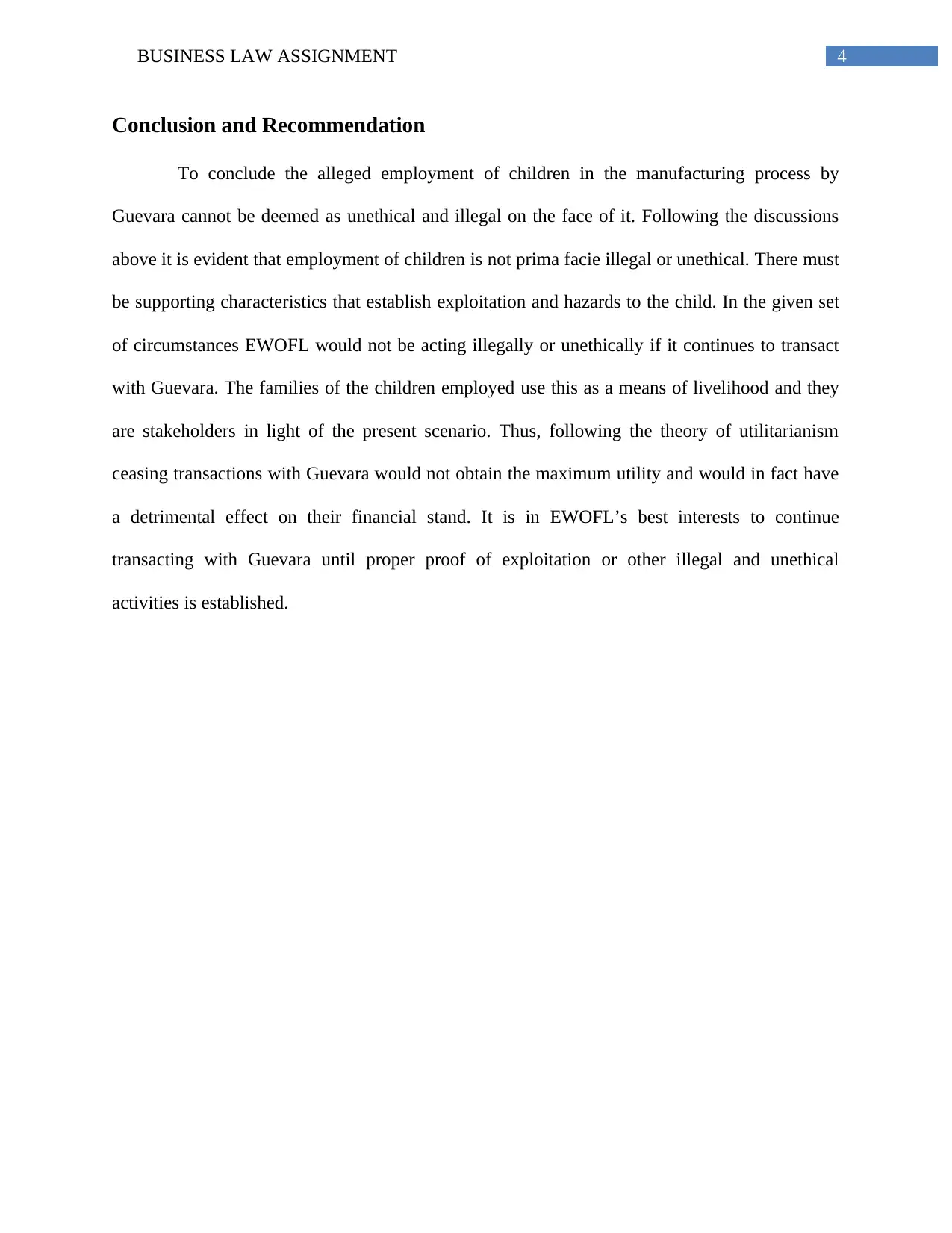
4BUSINESS LAW ASSIGNMENT
Conclusion and Recommendation
To conclude the alleged employment of children in the manufacturing process by
Guevara cannot be deemed as unethical and illegal on the face of it. Following the discussions
above it is evident that employment of children is not prima facie illegal or unethical. There must
be supporting characteristics that establish exploitation and hazards to the child. In the given set
of circumstances EWOFL would not be acting illegally or unethically if it continues to transact
with Guevara. The families of the children employed use this as a means of livelihood and they
are stakeholders in light of the present scenario. Thus, following the theory of utilitarianism
ceasing transactions with Guevara would not obtain the maximum utility and would in fact have
a detrimental effect on their financial stand. It is in EWOFL’s best interests to continue
transacting with Guevara until proper proof of exploitation or other illegal and unethical
activities is established.
Conclusion and Recommendation
To conclude the alleged employment of children in the manufacturing process by
Guevara cannot be deemed as unethical and illegal on the face of it. Following the discussions
above it is evident that employment of children is not prima facie illegal or unethical. There must
be supporting characteristics that establish exploitation and hazards to the child. In the given set
of circumstances EWOFL would not be acting illegally or unethically if it continues to transact
with Guevara. The families of the children employed use this as a means of livelihood and they
are stakeholders in light of the present scenario. Thus, following the theory of utilitarianism
ceasing transactions with Guevara would not obtain the maximum utility and would in fact have
a detrimental effect on their financial stand. It is in EWOFL’s best interests to continue
transacting with Guevara until proper proof of exploitation or other illegal and unethical
activities is established.
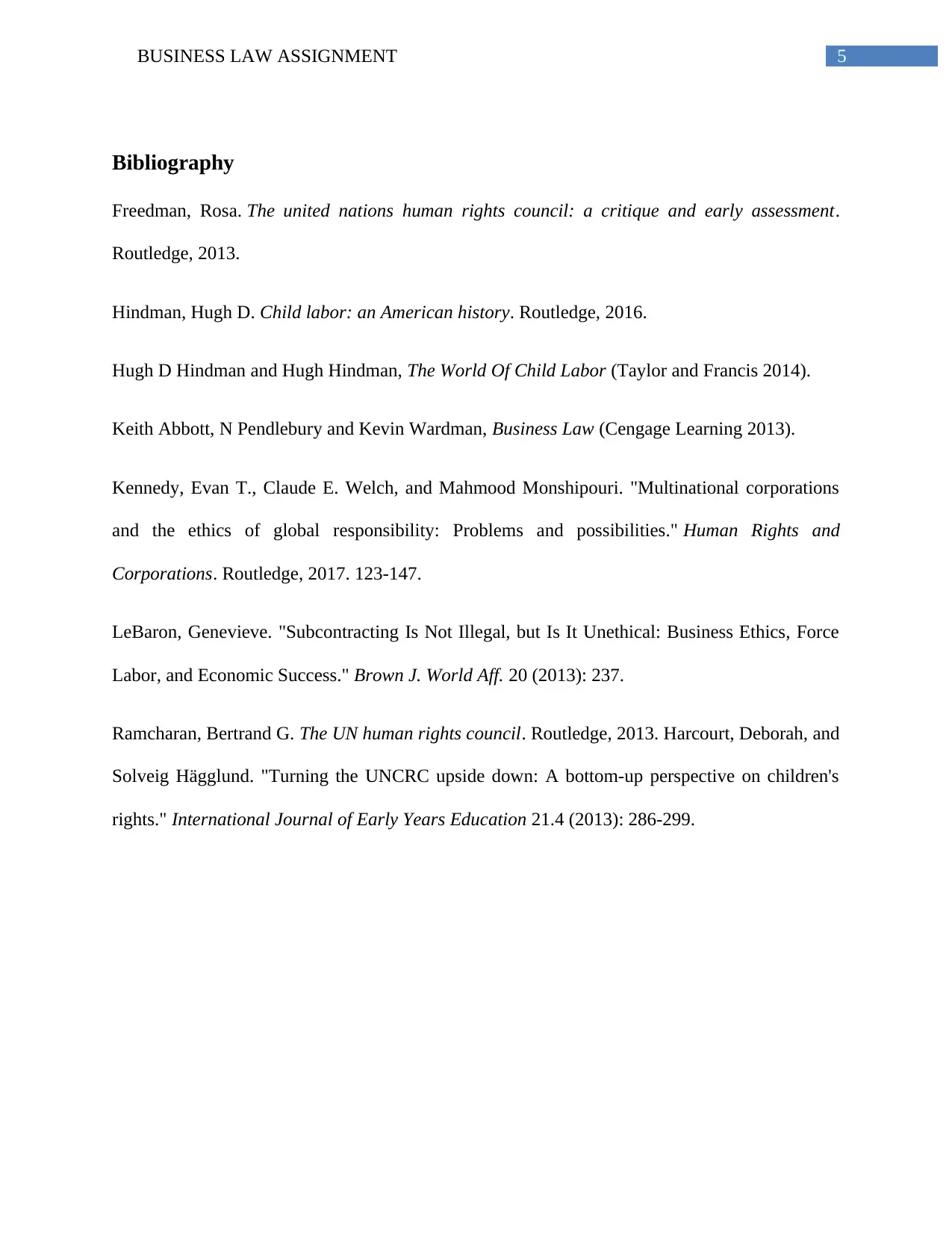
5BUSINESS LAW ASSIGNMENT
Bibliography
Freedman, Rosa. The united nations human rights council: a critique and early assessment.
Routledge, 2013.
Hindman, Hugh D. Child labor: an American history. Routledge, 2016.
Hugh D Hindman and Hugh Hindman, The World Of Child Labor (Taylor and Francis 2014).
Keith Abbott, N Pendlebury and Kevin Wardman, Business Law (Cengage Learning 2013).
Kennedy, Evan T., Claude E. Welch, and Mahmood Monshipouri. "Multinational corporations
and the ethics of global responsibility: Problems and possibilities." Human Rights and
Corporations. Routledge, 2017. 123-147.
LeBaron, Genevieve. "Subcontracting Is Not Illegal, but Is It Unethical: Business Ethics, Force
Labor, and Economic Success." Brown J. World Aff. 20 (2013): 237.
Ramcharan, Bertrand G. The UN human rights council. Routledge, 2013. Harcourt, Deborah, and
Solveig Hägglund. "Turning the UNCRC upside down: A bottom-up perspective on children's
rights." International Journal of Early Years Education 21.4 (2013): 286-299.
Bibliography
Freedman, Rosa. The united nations human rights council: a critique and early assessment.
Routledge, 2013.
Hindman, Hugh D. Child labor: an American history. Routledge, 2016.
Hugh D Hindman and Hugh Hindman, The World Of Child Labor (Taylor and Francis 2014).
Keith Abbott, N Pendlebury and Kevin Wardman, Business Law (Cengage Learning 2013).
Kennedy, Evan T., Claude E. Welch, and Mahmood Monshipouri. "Multinational corporations
and the ethics of global responsibility: Problems and possibilities." Human Rights and
Corporations. Routledge, 2017. 123-147.
LeBaron, Genevieve. "Subcontracting Is Not Illegal, but Is It Unethical: Business Ethics, Force
Labor, and Economic Success." Brown J. World Aff. 20 (2013): 237.
Ramcharan, Bertrand G. The UN human rights council. Routledge, 2013. Harcourt, Deborah, and
Solveig Hägglund. "Turning the UNCRC upside down: A bottom-up perspective on children's
rights." International Journal of Early Years Education 21.4 (2013): 286-299.
⊘ This is a preview!⊘
Do you want full access?
Subscribe today to unlock all pages.

Trusted by 1+ million students worldwide
1 out of 6
Related Documents
Your All-in-One AI-Powered Toolkit for Academic Success.
+13062052269
info@desklib.com
Available 24*7 on WhatsApp / Email
![[object Object]](/_next/static/media/star-bottom.7253800d.svg)
Unlock your academic potential
Copyright © 2020–2025 A2Z Services. All Rights Reserved. Developed and managed by ZUCOL.





